50 on Stonewall: The LGBTQ Community on the lasting impact of the historic uprising
Fifty people talk about what Stonewall means to them, how things have improved, and where the future of the movement lies.

The spark started with a police raid.
Fifty years ago, when the queer patrons of New York’s Stonewall Inn left their homes for a night on the town, they could not have predicted that they would be remembered and honored by generations of LGBTQ people. For them, the riots that followed a police raid in the early morning hours of June 28, 1969, were a natural, perhaps even inevitable, reaction to an occupying force that frequently invaded the places where they sought refuge, pushing them beyond the breaking point.
Tempers flared. Bottles were hurled. And police clashed with Stonewall’s patrons, as well as the homeless youths who came to their aid. The skirmishes that ensued over the next few days would awaken a revolutionary spirit within the LGBTQ community across the country — people who, perhaps for the first time, began to realize they did not have to accept mistreatment at the hands of police, the government, or the greater society in which they lived.
While LGBTQ people, under the leadership of Frank Kameny and others like him, had peacefully picketed outside Philadelphia’s Independence Hall and the White House earlier in the decade, the Stonewall Riots marked the first time in recent memory that the community had pushed back with such force. Within a few years of the riots, LGBTQ advocacy groups and political clubs began sprouting up in cities across America.
While the riots were the match that set the world aflame, the kindling that twirled the fire had been in place for some time. Centuries of queer people, many closeted, were forced to suffer indignities, both small and large, stemming from years of secretive relationships, torment, and abuse by their fellow citizens, violence at the hands of police, social ostracization, and even a coordinated campaign by the U.S. government to purge known homosexuals from all federal service jobs.
Even in the decades following Stonewall, while the existence of LGBTQ people could not be disputed, we were all too often ignored or outright rejected. Yet we persisted, even as our cries for equal treatment fell — and, in some instances, continue to fall — on deaf ears. Whether it was the blind eye turned to the AIDS crisis of the 1980s, the demonization of the community as degenerates during the culture wars of the 1990s, or even the flood of same-sex marriage bans approved by voters in the early 2000s, LGBTQ people and our allies have proven indefatigable and resilient.
In recent years, we have enjoyed several successes, including the repeal of a ban on gay military service, the legalization of marriage equality, and a host of federal court decisions recognizing the dignity of LGBTQ people. But recent actions have proven that many of the freedoms we enjoy are merely an election or a Supreme Court decision away from being removed. It will be up to future activists to preserve the community’s place within society.
In commemoration of the 50th anniversary of the Stonewall Riots, 50 prominent local and national figures shared their reflections of the anniversary, the changes they’ve seen in their lives, and the evolution of the modern-day civil rights movement. What follows are highlights from their responses, providing testament to how far we’ve come, and how far we still have to travel along the path to not just nominal equality, but full, lived equality.
When did you first hear about Stonewall? What does Stonewall mean to you?
Ba’Naka, 34, Queer, Entertainer: It was the mid-nineties. I must have been 10 or 11, and I came across a movie called Stonewall. All I knew about gay was that it was bad, shameful, and it was how you got AIDS — oh, and that I might just be one. That movie told the tale of a group of transwomen and queens who, on that fateful night had had enough, and took a stand. Sure, the movie was campy and had a cis white male lead, but the story was there and for once I was shown LGBTQ people in a powerful light. Stonewall for me will always be that moment in our history where we said “NO MORE, NOT HERE, NOT NOW!”
Nick Benton, Newspaper Editor: I came out just prior to Stonewall in San Francisco with the help of an existing gay advocacy organization, the Council for Religion and the Homosexual. Most of us in the West did not hear much about Stonewall for at least six months. To us, it was just part of the ongoing unfolding of our movement that was being fueled by the civil rights and anti-war movements. Nonetheless, there is no doubt, in retrospect, that Stonewall was a turning point and led to the formation of the Gay Liberation Front, of which I was a co-founder in Berkeley, and of a gay press, including the Gay Sunshine in Berkeley, for which I wrote the editorial in its first edition.
Keith Boykin, 53, Gay, Author: I first heard about Stonewall after I came out in 1991 and learned about LGBTQ history. For me, Stonewall is a symbol of resistance against oppression and a reminder of the power we have when we fight for liberation. I’m proud that trans women of color like Marsha P. Johnson and Sylvia Rivera helped to lead that fight.
Gillian Branstetter, 30, Transgender, Media Relations Manager: Stonewall holds a central place in the history of LGBTQ people in this country, but I worry it’s in danger of being sanitized to the point of futility. We as a country have a habit of gentrifying our memories of specific events. Labor Day is no longer about the importance of workers, but about cookouts. Stonewall and Pride, too, are quickly losing their historic intention and being replaced by parades, banners, and marketing.
Yuval David, Gay-Bi-Queer, Actor/Filmmaker: The historic Stonewall Riot and the history of the LGBTQ Community was first introduced to me as a student in U.S. history class at the Jewish Day School. We discussed Equal Rights and how that battle is one that we must all stand up for in representing our fellow citizens. I assumed this was part of a “normal” education in U.S. schools. It saddened me when I found out that other kids at other schools were not exposed to that part of U.S. history.
Lee Gable, 58, Gay, Producing Artistic Director for Rainbow Theatre Project: Stonewall means to me that a person can only take so much abuse before you fight back. Stonewall means standing up for oneself, no matter how scared you might be.
Jack Gerard, 65, Gay, Retired: Stonewall eventually led to so many monumental things: the reversal of the psychological definitions of various sex-identity mental illnesses. It led to opening the dialogue about what queer people could freely be, without fear of reprise, job and housing discrimination, and/or imprisonment. It led to compassionate treatment of people with AIDS, Marriage Equality, and so many more victories.
Edward Harper, 48, Gay, Program Specialist: I first heard about Stonewall as a twentysomething in NYC for the first time. At the time when it was explained to me by a peer it was framed in the context of white gays only. As I have grown older, I quickly have come to understand that it was about gays, period! The fact that trans women, men, and POCs were at the front of the event and have become poster children makes it even more valuable to all who identify as LGBTQ. It means that as a gay male I am able to be my authentic self and know that I have value and should continue to fight for my rights.
Shin Inouye, 40, Gay, Communications: I don’t remember when I first heard about Stonewall, but it has certainly come to represent one of the first main acts of civil disobedience for the LGBTQ community. It was an incident when a community that had long been oppressed said enough is enough. But it’s important to remember it wasn’t the first protest. Four years earlier, Frank Kameny, who was fired from his government job for being gay, led a protest outside the White House. It was touching that at his first Pride event at the White House, President Obama recognized him, saying, “Frank was fired from his job as an astronomer for the federal government simply because he was gay. And in 1965, he led a protest outside the White House, which was at the time both an act of conscience but also an act of extraordinary courage.” All these events are part of the larger struggle.
Anthony LeCounte, 30, Gay, Student: I first heard about Stonewall as an iconic part of LGBTQ culture after I went to college in New England. I had never learned anything about LGBTQ history, culture, or identity before then, so I didn’t understand the reference and for a long time was too embarrassed to ask. Part of that embarrassment, beyond how everybody else seemed to be “in the know,” was that I was confused. As a Southern kid who graduated from high school in Virginia, the only “Stonewall” I knew of was Stonewall Jackson, and I could not for my life figure out why all those Northern gays were so obsessed with him.
Linda Lewis, 64, Lesbian, Left of Center Productions: Back in the ’70s, I heard about what was going on in NYC and the uprising of the Gay Movement, but never really understood until the ’80s and ’90s what this was all about. I never understood why our own community did not support the trans community and the bisexual community, for that matter. We all need to support each other and learn to accept everyone’s differences.
Eileen Maxwell, 62, Ally, Public Relations Professional: I first head about Stonewall over 14 years ago when the Hirshhorn Museum had an exhibition on gay protest signs and art. I was horrified. Stonewall became very personal for me when I befriended Jack seven years ago — he had been part of the Stonewall protests themselves. His firsthand accounts shook me to the core.
Taissa Morimoto, 28, Queer, Policy Counsel at The Task Force: I first heard about Stonewall when I was in college, but my understanding of the riot and what it means to me changes every year. To me, Stonewall means resilience. It means fighting for our lives because we have to. It’s about community — about people in the LGBTQ community who are experiencing the greatest hardships. It’s about coming together for justice and equity.
Will O’Bryan, 49, Gay, Operations Manager at MetroNando/RLAH Real Estate: I started building an idea of the Stonewall Riots in high school, via mentions in news magazines like Time or Newsweek. Reading any mention of Stonewall was really powerful to me, realizing I was born the same weekend. My mom had always called me a “moon baby” because I was born a couple weeks before the moon landing. I made my own identity as a “Stonewall baby.”
Dominion ONYX, 48, Gay, Program Manager: Stonewall stands as a constant reminder to me that sometimes we have to fight for our rights in the face of a society that continues to find ways to chip away at them. I think about the courage of those black and brown gay, lesbian, and trans people who fought for our rights to exist. Stonewall is a reminder not to let your history be erased, because mainstream gay culture has tried to erase those people from the movement.
Philip Pannell, 68, Gay, Executive Director of a Non-Profit Organization: I attended Fordham University in New York City and I used to hang out in Greenwich Village in 1968 and 1969. I was aware of how resentment was building toward the police because of the way they treated gays in the bars. On the night of the Stonewall Riot, I was in the Bon Soir, a gay bar a few blocks from the Stonewall Inn. I remember someone running into the bar shouting that the Stonewall was being raided and that some of the patrons were fighting with the police. Many of us in the Bons Soir rushed out toward the Stonewall. I remember the crowd gathering and the shouts of support for those fighting the police. I remember some folks in the crowd throwing pennies at the police and shouting how the cops were paid off by the Mafia.
Neal Racioppo, 50, Ally, Director of Marketing: In 1988, I was a freshman at UCLA and my friend John invited me to stage manage a production of Torch Song Trilogy he was directing. Shortly thereafter, I learned he was gay. I was a young, straight, theater kid with absolutely no gaydar whatsoever. I was completely shocked. John and I went out to a diner that served tiny ice cream sundaes and we ate about 30 of them while he gave me a crash course in gay America — everything from his own personal coming out story to the coming out stories of friends. He told me about Harvey Fierstein and the importance of Torch Song, what bathhouses were, how Bette Midler started there, the AIDS epidemic, the quilt, Liberace, Rock Hudson, Tennessee Williams, the significance of the gay community being visible, how gay men were the first targets in the Holocaust, how he could be out but his boyfriend wasn’t ready to be and, perhaps most importantly, why Jennifer Holiday’s “And I am Telling You” is the greatest fucking show tune of all time. He also taught me about the Stonewall Riots and how they happened right after Judy Garland had died. The police came to fuck with the queers like they always did and the queens were not having it. I like that part of the story. How everyone was in mourning for Judy and they weren’t going to let the cops disrespect her memory, so they stood up to them. That’s fierce.
Mary Snider, 56, Lesbian, Insurance Agency Owner: Stonewall means the world to me. Courage, resistance, empowerment, pride. We owe the Stonewall activists a debt of gratitude that cannot be overstated. It is a debt that cannot be repaid except in one way: to ensure we continue to improve the lives of the LGBTQ community, so that we don’t ever have to experience oppression and violence towards us like that ever again. We cannot go back.
Rich Tafel, 57, Gay, Pastor, Social Impact Investor: Stonewall holds a sense of historic respect. However, it also frustrates me. Knowing LGBTQ history, I know about Harry Hay and the Radical Fairies, George Kamney and Mattachine Society and Barbara Gittings of Daughters of Bilitis. There were so many people taking personal risk to advocate for our rights that are forgotten. So it frustrates me that a police raid, which is terrible, eclipses the rest of history because it is dramatic. I’m glad I got to know a few of these and many other icons. Many of the bravest were those in who came out in the gay conservative movement. Stonewall is great, but let’s not forget those who preceded it.
Devon Trotter, 35, Life Coach/DJ: I can’t remember when I first heard about Stonewall, but it almost feels as if the event is embedded in my DNA. Much like being gay, it was there, and I just didn’t know what it was. It finally hit home for me in 1999 when I was 15 and there was a news story about the anniversary of the riots. At that point I had already begun exploring my sexuality, and felt very secure in it. And learning about the riots made me secure in my queerness. I was always “alternative.” Black, poor, gay, skater, surfer, raver kid. Stonewall validated my subversiveness and confirmed that I was part of something much larger than I could conceive at that point in my life.
David Winer, 59, Gay, Restaurant Operator: I was in my late teens, just coming out, had heard of the riots but not a lot of info. Being gay in Boston and NYC in the late ’70s was easy and fun. Stonewall, though just a decade earlier, seemed very distant.
Robert York, 51, Gay, Director of Development, NMAC: Stonewall is vitally important to our history and the uprising for our rights as LGBTQ citizens in the United States. Female impersonators have always been on the front lines speaking up, acting out and raising money for our community in the times we needed them the most and they used their artform and platforms to fight for equality and justice with their transgender activists as well.
Stonewall was a sanctuary for many LGBTQ people. In 2019, where do you feel safe as an lgbtq person?
Ba’Naka: Fifty years after Stonewall I feel my safest and truest self in gay bars. To be surrounded by your community in shining lights, dancing and laughter. It’s a place of celebration, of union. It’s my version of church, I exercise my demons on the dance floor, the DJ is my Choir, the Drag Queen my confessional, and I have plenty of Saints to pray to — the Blessed Mother Madonna, Beyonce, Britney, Gaga, Ariana….
Nick Benton: The Stonewall Inn was one of a number of gay bars in the Village, but unique for allowing go-go dancers and dancing. It was a haven as part of a wider environment for so many displaced youth in that time, but on the downside, the bar was run by the mob, which also used it for money laundering and underage prostitution/blackmail operations. After the riots, a key element of the gay organizing was to kick the mob out of the gay scene, but it gave way when the mob tried to co-opt it by, among other things, changing the direction of the Pride marches so that they would end, rather than begin, in the Village and add tons of revenue to the mob coffers as a result. Bars remain our best “safe places” to this day.
Gillian Branstetter: I’ve actually found creative communities — and poetry readings in particular — to be fantastic outlets. D.C. has a fantastic collection of readings and venues including Split This Rock, Capital Q, and events hosted by Busboys & Poets or the Potter’s House.
Charlotte Clymer, 32, Gay/Queer/Lesbian, Press Secretary for the Human Rights Campaign: Honestly, I’m not sure I feel entirely comfortable anywhere as an LGBTQ person. We live in an era of unprecedented attacks by our government on our community, which enables cultural shaming, violence, and discrimination. It’s why it’s so important to fight back and be heard. We need to take up space today for other LGBTQ people to feel safe tomorrow.
Larry Cohen, 63, Gay, Psychotherapist: I generally feel safe everywhere in this city now. That wasn’t true when I first moved to D.C. in 1988. The Lambda Rising bookstore felt like a sanctuary to me then.
Ray Daniels, 52, Gay, Corporate Manager: I feel safe in most spaces as an LGBTQ person. I feel less safe as Black Man. Unless I self-identify or am with a group of friends, folks don’t immediately recognize me as gay, but I am always Black.
Joan Garry, 62, Lesbian, Consultant/Author: I feel an overwhelming sense of fear today. I “feel” safe with my wife and kids, but I also feel it is tenuous and something of an illusion. During the Obama administration, I felt welcomed and seen. Today, that sense of security has been taken from us. Feeling safe and then not? It’s even more frightening in some ways. And one of my three kids is a lesbian. She is 24 and I worry about her most of all.
Holly Goldmann, 42ish, Intersex but identify with Trans umbrella, Development Director at Casa Ruby: Writing this, I just returned from the vigil at Dupont Circle about the rash of hate crimes in D.C. And reminded that 10 trans women of color have been murdered this year. Plus there was a death at Rikers and ICE. So I’ve been on guard. I find myself looking at my surroundings more. I mostly feel safe, but I’m thinking that’s changing.
Anthony LeCounte: When I was growing up in the Army community, a popular phrase was “Home is where the Army sends us.” I feel similarly about safety with LGBTQ people: Home is where the community is. In an obvious sense, that means overt LGBTQ spaces like gay bars, clubs, and so on. But it also means any space, including house parties, churches, hiking trips, guerrilla queer bars, Pride events, where there is a critical mass of LGBTQ family to create the sense of belonging and rootedness that is evocative of what home should be.
Linda Lewis: With the current administration that we have in office, it is hard for anyone to feel totally safe in public places. Hatred is accepted and encouraged with a racist President. The LGBTQ community is always at risk, especially trans women of color. “Public Display of Affection” is something I would never think of displaying unless I was within a safe environment within my own community.
Denny Lyon, 74, Gay, Unemployed: I currently don’t feel “unsafe” anywhere. I’m out and open to everyone. I fly the rainbow flag along with Old Glory at my home in Virginia. I’ve never received any kind of negativity or backlash as a result.
Taissa Morimoto: Just three or four years ago, I would have responded that I felt safe in queer spaces, in LGBTQ clubs and bars, but that has changed so quickly and so drastically. The reality for so many people in oppressed communities is that we don’t feel safe anywhere. We don’t feel safe in our own skins. This means that we are always anxious and on alert for danger. I invite you to imagine what that feels like — to live in a world that is so committed to putting our lives in danger. People in LGBTQ communities — especially Black and Latinx people, transgender and nonbinary people, and people of different faiths — often never feel safe.
Dominion ONYX: I rarely feel unsafe, in that I feel a threat to my person. I have been made to feel unwelcome. But I feel the most welcome in leather spaces, among those with whom I share common interests in kink and politics (mostly).
Alexa Rodriguez, 42, Transgender, Trans-Latinx DMV Director: I’m gonna be honest. I only feel safe in my apartment when I am all alone. Nineteen trans women have been killed, and as an immigrant brown trans woman I feel in danger every day, while coming to work, when I go shopping for my groceries, or doing laundry.
Michael Sainte-Andress, 68, Gay, Actor/Writer: Hardly anywhere, if the truth be known. Just this past weekend in D.C, two young men were accosted and robbed in what’s considered a “gay area” in the U Street corridor. All around the city I witness and have been a target of potential “gay-response violence.” Slurs, name calling, threats, insults, and ridicule are daily endurances that many LGBTQ people face and suffer through. It is very disturbing because those who perpetrate these behaviors feel justified and indeed “empowered” to do what they do.
Ron Simmons, 69, Bodemé, Retired: Being a Black person in America, I have learned to always be on guard. I don’t take my safety for granted no matter where I am.
Mary Snider: I generally feel safe as an LGBTQ person in D.C., though I realize how privileged I am as a white lesbian to be able to make that statement. I walk around the city, especially on 14th Street, and see all these rainbow flags and signs everywhere expressing support. It is amazing. A few years ago, you could barely get a shop to put a small rainbow sticker in the window.
Zar, 34, LGBTQ Adjacent, Project Manager, Team Rayceen Event Production: I honestly feel fairly safe just about anywhere in D.C. Perhaps I’m a bit of an anomaly because I have never had any significant incidents with bias in that regard. But I am a bit more apprehensive when I’m outside of D.C., especially in suburban and rural areas beyond the Beltway.
The Stonewall Riots were sparked by a police raid. How do you feel relations between the LGBTQ community and police have changed over the years?
Miguel Ayala, 40, Gay, Manager of the DC Eagle: I appreciate the LGBTQ Liaison’s outreach and presence at many events. I know that there are some members of the community who feel triggered by their presence, but I hope we can get to a place where we can appreciate the safety and security our police provide for everyone.
Nick Benton: Generally, police and related organizations have been among the best to address issues of hate crimes and violence against the LGBTQ community, although that of course is a mixed bag and more effort needs to go into it. Back in the Stonewall day, of course, police violence against gays was very common and sanctioned, and many corrupt police used it to extract bribes and payoffs from bar owners, including the mob.
Keith Boykin: I think the largest problem with police relations is for LGBTQ people of color. Black trans women are still being murdered every month, and it’s not clear to me that many police departments treat these crimes seriously. In addition, black and Hispanic LGBTQ people still face racial profiling and police brutality on a regular basis because of their race or ethnicity. I’ve been profiled, stopped and harassed by police in New York and Washington, D.C. For black gay men like myself, our sexual orientation does not save us from racism in policing.
Gillian Branstetter: I honestly don’t know that they have. Law enforcement has worked to change their image by pursuing “band-aid” policies like LGBTQ liaisons that don’t address a lack of training, affirmative policies, or accountability.
Destiny B. Childs, 41, Gay, Federal Government Employee: I feel the police respect us as a community and treat us with the respect any human is due.
Charlotte Clymer: Many members of law enforcement have worked in good faith to be better allies to the LGBTQ community, but the sad reality is that many, if not most, are still ignorant of the challenges that face us and hostile to cultural literacy. I have great respect for law enforcement, and therefore, I demand they be held to the very highest standards of professional conduct. They should reflect and honor all citizens, including LGBTQ people.
Yuval David: In New York City, the NYPD [recently] apologized for the raid and for their attacks on the LGBTQ Community. That apology took 50 years! But we are also at a time when police in major cities in the U.S. have LGBTQ representation among themselves. Yet, that is only in the major U.S. cities. We have so much further to go.
Russwin Francisco, 53, Gay, Retailer: I believe the D.C. police are very sensitive to the issues facing the LGBTQ community. Although there is a 36% increase in hate crimes targeting LGBTQ people in the District — the percentage is higher for black transgender women. I don’t believe the uptick in hate crimes is caused by insensitivity or lack of awareness on the part of the MPD. Perhaps, increased police presence or visibility near LGBTQ establishments may help. Although these statistics are not comforting, there was a time when these incidents were not called “hate crimes.” The MPD has had an LGBTQ liaison unit for nearly 20 years. Today, there are visible signs of the mayor’s office and the MPD working to swiftly address issues facing the LGBTQ community.
Lee Gable: Generally, relations have improved, at least in the more urban areas. However, there is a lot of work to still be done. There are a lot of individuals who look at their positions as police as a means to assert authority. A power game. I saw this a lot when I was in the military. The majority of people want to do what is right and join the police (like the military) for the right reasons, to serve and help others. A small group of people join for other reasons, because they like the sense of power and they exploit that. I think the fact that there are police officers who want to march in Pride parades is a plus for our community.
Joan Garry: Visibility drives understanding and understanding drives acceptance. In 1969, the police understood us the way everyone else did. Sick, disordered, deeply depressed, suicidal, incapable of relationships. Society told law enforcement we were essentially inhuman.
Today thanks to the courageous men and women who stood up and came out, who said “no more,” and to the efforts of so many individuals and organizations, the LGBTQ community is seen as human. We marry, we have kids, we are even law enforcement officers! Again the challenge is our societal climate. Now giving permission to those in power to treat all minorities as second class citizens, as less than. In this context, law enforcement officials are now emboldened to be bullies. When the leader of the free world is a bully, it offers police license to abuse their power.
Joseph Izzo, 71, Non-Binary, Retired Psychotherapist: When I first came out there was still a very adversarial relationship between the police and the LGBTQ community. Over time, and thanks to enlightened city politicians like Rep. Eleanor Holmes Norton and even former Mayor Marion Barry, the relationship improved with the guidance and education of the police force by Sgt. Brett Parson and his colleagues. We are very fortunate in this city since in other locations in this country and around the world, the police continue to harass, demean and persecute LGBTQ people.
Jack Newman, 18, Gay, Student: I believe the tension between the LGBTQ community and law enforcement has grown increasingly worse. For example, the Queer Liberation March taking place at World Pride in NYC will have zero law enforcement. This goes to show that members of the LGBTQ community are still affected by the violent incidents such as the Stonewall movement and what we view in the media today.
Hannah Olanoff, 57, Lesbian, Therapist: I think it’s situational. I think in general police have come to rely on a military mentality rather than one more oriented to community. As a result, when any kind of tensions arise it develops into an adversarial “Them vs. Us” situation far too quickly. I think it is also geographic. I think trans folks are most often still in danger from the police everywhere.
Randy Pumphrey, 61, Gay, Psychotherapist, Senior Director of Behavioral Health at Whitman-Walker Health: I’ve had both amazing experiences and deeply frustrating ones. I’ve worked side by side with officers who were kind, compassionate and not only willing, but wanting to be affirming, while helping me get my clients to a hospital for care. But I have also worked with some who are arrogant and self-willed, that embarrass the uniform they wear.
Alexa Rodriguez: I am still scared. I have suffered verbal violence from police officers in PG County for being trans — and I was the victim! The only thing that has changed is that today we have social media — technology to prove when our rights are violated, and also to spread the word within our community about what is going on around the globe. Yes, there are trans people in law enforcement, there are LGBTQ Liaison Units, but that doesn’t guarantee that we will be protected. They will always be police officers first, you know!
Ron Simmons: In D.C., a great deal since we have gay liaison police units. But I think it is also a question of race and class. In other parts of the country, I’m not sure if the interaction between the police and a Black, gay, homeless teenager would be the same if he was white, adult and middle-class.
John Stoltenberg, 75, Gay, Writer: While it’s true that in many places, police officers can be out and proud, too many male cops are still under compulsion to prove their manhood through violence — and that will always have brutal consequences.
Devon Trotter: The problem I have with this question is that it, much like the LGBTQ community at large, neglects intersectionality. Sure, strides have been made between the community and the police in attempts to have a better relationship. Yes, some agencies have LGBTQ units strictly devoted to the needs of the community, but until the police stop murdering and over-policing Black men and actually devote adequate resources to solve the murders of trans women of color, and protect young Black girls from sex trafficking, then there will never be and should never be good relations. If one segment of the community is hurting, we’re all hurting.
Vernon Wall, 59, Gay, President of One Better World: Black and brown people and trans folk continue to be murdered at the hands of law enforcement at alarming rates. This is a fact. And, the D.C. Metro Police have been incredibly open, progressive and responsive in having conversations with our community and develop mechanisms for change to happen. In times like these, we need to be developing relationships with the law enforcement community, not pushing them away.
Dr. Imani Woody, 60+, Lesbian, Founder, CEO Mary’s House for Older Adults: I remember the police coming in LGBTQ spaces, harassing and trying to entrap people. Now, I invite the police department to Mary’s House for Older Adults events. There is an LGBTQ police liaison in the hierarchy of the police structure that is connected with the Mayor’s Office of LGBTQ Affairs. Look, there is an Office in the Mayor’s office for LGBTQ Affairs, connected to the police. I’d call that change.
What are the worst anti-LGBTQ slurs you have ever been called?
Miguel Ayala: I’ve been referred to as a faggot or maricon plenty of times — too many to count.
Ba’Naka: I’ve heard them all and probably have said them all. Words hurt, we shouldn’t allow them the power, but we do. It’s awful. But I will say this, call me a faggot in the streets, we are gonna have words — unless that’s how you are catcalling me, at that point we can negotiate.
Charlotte Clymer: I don’t know how to explain how shattering it is to be misgendered purposefully. It hurts like hell because it is a wholesale invalidation of my humanity. It is a denial that I exist.
Larry Cohen: Faggot. Queer (before it got reclaimed). Sissy. This began in middle school, and continued off and on through the early ’90s, maybe a little longer. Now its very, very rare. I was the victim of anti-gay violence in Detroit in the mid ’80s, and in D.C. in the late ’80s, with accompanying anti-gay slurs. This shook me up and made me scared and hyper vigilant for a while. But it did not send me back into the closet.
Ray Daniels: I have been called faggot a few times, but nothing more. It was mostly whispered and never directly to my face. I have faced far worse as a black man.
Yuval David: I was walking toward the LGBTQ Pride Parade, wearing a rainbow colored outfit, and holding a pride flag with a Jewish Star on it. As I was on route to this important parade — a place where we celebrate pride in who we are, as a diverse LGBTQ Community — a group of guys started calling out slurs, “Fag! Jew-Fag!” It emboldened my need to boldly be me, to boldly represent all of me, each element of my identity.
John Fanning, 56, Gay, Business Compliance Specialist: I was once physically assualted and robbed in a what they called back then a gay-bashing after leaving a gay club one evening here in Washington, D.C. The assailants shouted out homophobic slurs — faggot and queer motherfucker. The situation made me fear for my life and safety, and that there’s individuals that struggle with acceptance and hate.
Lee Gable: Faggot, cocksucker, queer, sissy. I got called sissy a lot when I was growing up, mostly from relatives. That stopped when I was an adult and began telling them that I did not like it when they used the word. Surprisingly, they pretty much stopped saying it, at least in my presence.
Joan Garry: The worst? Pure silence. For 25 years, my wife’s mother never said my name out loud. I was never welcome in their home. Until I was able to secure a second parent adoption, I lived in fear that if something happened to Eileen, her mother would come and take my children from me. That said, I did not allow her to diminish me. I think had a strong sense of myself. But I lived in abject fear that she could steal my children from me.
Jack Gerard: Sissy in my childhood, faggot in my later years. I was extremely sensitive as a child, I always felt vulnerable around bullies or macho, more aggressive guys. Being called sissy was very shameful.
Holly Goldmann: I don’t think it’s publishable.
Leti Gomez, 64, Lesbian, Manager in Department of Navy: I was mowing my front lawn once. My house was on a busy street near a traffic light. Traffic was stopped and I heard a guy yell from his car, “Dyke!” I don’t think of “Dyke” as a slur, but I was annoyed that he felt he had the right to yell it at me.
Jose Gutierrez: Two months ago I was walking by 17th Street and an individual called me profanities. He was driving a bicycle and I felt fear, intimidated, and scared for my life. I was thinking to call the police and I walked really fast to a restaurant and the person disappeared.
Christopher Henley, 62, Gay, Actor/Theater Director: Faggot, Cocksucker, Fem (junior high, that was considered an insult). I’ve been called gay and queer, but those are also terms we embrace. I embrace them all. “Cocksucker? You say that as if it were a bad thing!”
Anthony LeCounte: I’ve been called just about everything in the book. Since I’m also black, Christian, and a conservative, I’ve gotten a whole slew of extra invective in more contexts than I can count from folks who take issue with any nexus of my race, politics, or sexual orientation. The most common are along the lines of “faggot,” “house faggot,” “faggot nigger,” and so on. They’re not terribly original nor, thankfully, all that common, but the experience is invariably jarring. Sometimes, the slurs come with either implicit or overt threats of violence, and I’ve been nearly hate-crimed on several occasions around D.C. These experiences inspired me to be more mindful of my surroundings, the people I’m with, and ways to identify and deal with potential threats. They also inspired my fiancé and I to train for and acquire concealed carry licenses for self-defense, should it ever come to that. Thankfully, it hasn’t yet, and I hope it never will.
Eileen Maxwell: I’m an ally but I have felt those slurs like a knife in my heart when, several years, ago my 18-year-old gay nephew came home after a Saturday night out distressed and told me, “Well, it finally happened. Someone called me a faggot.”
Blair Michaels, 54, Gay, Entertainer: While living in San Francisco, California in the early ’80s I was chased up the streets of San Francisco (while in drag) being called “AIDS spreader.” It was the most terrifying experience I’ve ever had to this day.
Jack Newman: I have been called a “he/she/thing/it” and a “faggot.” I have often felt indignant and frustrated when faced with oppression.
Hannah Olanoff: Dyke. Pussy-eating bitch. Queer. It wasn’t the words themselves, it was how they were spewed with a snarl. With intimidation and disgust. It made me feel vulnerable and small, as if I had done something wrong for just being.
Philip Pannell: When I was growing up I was called sissy, punk, faggot, and queer so often that when I finally saw my birth certificate I was shocked that those names were not on it. The worst slurs I was called was when I was raped.
Rayceen Pendarvis, AARP Qualified, Emcee/Columnist: Gump, a term which comes from prison slang, which I was called on the street by a group of men when I was a teenager. It stunned me and made me feel uncomfortable. I didn’t know what the word meant at the time, but I knew I wasn’t being complimented on my outfit.
Randy Pumphrey: I was recently conducting a job interview at Whitman-Walker Health. My colleague asked about their experience working with LGBTQ persons. The candidate said that her godson was gay and that she told him, “He could still be a man, he didn’t need to be a FAGGOT!” I was stunned. Here I was sitting in an interview in D.C.’s largest and oldest LGBTQ health care provider and someone just said “FAGGOT.”
Michael Sainte-Andress: A “dick-sucking, AIDS-spreading, nigger faggot!” by a co-ed group of Black teenagers in a D.C. subway station and, “You lost, sick soul” by a prominent Black D.C. minister. In both instances I felt not only dehumanized and disrespected but betrayed.
Diego Miguel Sanchez, 62, Transgender, Director of Advocacy, Policy & Partnerships at PFLAG National: You name it, I’ve been called it, but the feelings from the people who name-called, not just the words, are what create the greatest risk, danger, and harm.
John Stoltenberg: I was called “soy boy” in online attacks on me for a critique of masculinity I’d published. I had to look it up.
Rich Tafel: In my political life as founder of Log Cabin Republicans I spoke at many events with hostile anti-gay audiences and they used every name you can imagine. The worst circumstance was at a rally in Ft. Worth, Texas, where an angry mob threatened violence and jumped on stage. Also, the left wing of the LGBTQ movement has used words to try to suppress gays who are conservative. They often used the expression “Jews working for Hitler” when we lobbied on LGBTQ rights and AIDS funding.
No one likes being called names, but I always consider the source.
Devon Trotter: I’ve been called them all. My favorites are the anti-LGBTQ and racist combintations. I’ve had them yelled at me from a car while walking down the street, I’ve had family members of close friends use them against me, homeless people on the street after denying their panhandling. I’ve had white gays call me racial slurs. But for me, the worst situation is when I hear anti-LGBTQ slurs from a Black person. I recently read a quote that sums up my feelings about it perfectly, “We shouldn’t have to fight you AND white supremacist capitalist patriarchy at the same time, all while supporting YOU against white supremacist capitalist patriarchy.”
How has the overall rise in LGBTQ acceptance affected your life?
Ba’Naka: I’m shocked and delighted, but I’m still not moving out to the suburbs.
Keith Boykin: When I came out in 1991, my mother warned me not to tell too many people for fear that it would hurt my career. Now, 28 years later, it’s obvious that coming out was exactly the right thing to do for me. I’ve worked on LGBTQ issues in politics, participated in the first ever presidential meeting between a U.S. president and LGBTQ leaders, led two LGBTQ organizations and written four LGBTQ books. Coming out didn’t hurt my career — it’s been a big part of making my career.
Destiny B. Childs: It is amazing to be able to go to work and speak about my husband and not fear repercussions. It is great to walk down the street holding my husband’s hand and not worry what others think.
Charlotte Clymer: I can’t imagine where I would be today were it not for all the trans women, particularly those of color, who came before me. I am able to live my authentic self because of Marsha P. Johnson, Sylvia Rivera, Laverne Cox, Janet Mock, Sarah McBride, Danica Roem, and so many others who have lived proudly and communicated to me that my true self is worth showing to the world.
Larry Cohen: It feels like I am leading a normal life now, and not the life of a social outcast. But again, as a cisgender white gay male, it’s easier for me than for some others.
Ray Daniels: I fought hard for marriage equality as I felt it was the gateway to break down other civil inequities. I served in the military during Don’t Ask, Don’t Tell, so I know firsthand what it is like to live an inauthentic life. The rise in LGBTQ acceptance has enabled me to live my life out loud and proud. I do not accept closet doors as my reality any longer. Like they say, it does get better.
John Fanning: It has definitely allowed me to feel more comfortable in public spaces, and with meeting other people because my sexuality really isn’t an issue and our LGBTQ lifestyle is more accepted in today’s society. It’s offered me several opportunities that I otherwise probably wouldn’t have had.
Russwin Francisco: I live an “out” life. My store [Bite the Fruit] flies the rainbow flag throughout the year. I participate in LGBTQ community events, fundraisers, political meetings. I mostly speak my mind when given the opportunity. There was a time when I held my tongue, opting to listen or observe instead. I believe one can learn a lot by listening. However, these days, when state sanctioned bigotry under the guise of “religious freedom” can mean being denied health care, child adoption or a wedding cake, I believe it is not time to hold back. When transgender people are banned from military service, I believe our voices need to be broadcasted as loudly, clearly and plainly as possible.
Holly Goldmann: I was raised as a little boy, but would say I evolved into a woman. It’s never caused me issues.
Eileen Maxwell: Beautifully! My 28-year-old nephew, who is gay, and I are so close — we are like mother and son and we always have been. But I decry that he could not come out to me when he was a child and when I could have helped him through puberty. I don’t believe parents should wait until their children come out to them about their sexuality as so many psychologists recommend. Gay children don’t typically open up to their parents even when their parents are totally accepting of the LGBTQ community — they still fear they will be unloved. This has to change. Parents should be proactive and open and loving with their children about their sexuality — even if they don’t know or feel that their child could be gay, they could be. For christsake, they’re the parent. It is wrong that only heterosexual children get parental guidance on dating and falling in love. All children need their parents during puberty. Parents need training! Don’t ask, don’t tell doesn’t work in family life either!
Dominion ONYX: It certainly made it easier for me to come out. It opened possibilities for my life that my 16-year-old self couldn’t have imagined. My biggest fears at the time were that I would never be happy, that I’d never have kids, that I would never have a normal life. LGBTQ acceptance has stripped away almost all of those barriers. I think 16-year-old Dominion would be shocked at the ways the world has changed.
Rayceen Pendarvis: It has opened doors for me in many areas, allowing me to host various events that are not LGBTQ-specific and to be one of the first openly LGBTQ people elected Advisory Neighborhood Commissioner in D.C. I now have more opportunities to be visible and teach people about diversity in our communities.
Randy Pumphrey: I’ve never been an apologist and have been proud of myself as a gay man and as a part of a larger community of queer people. That said, in 2013 I married my partner of 20 years. I have a rainbow flag on my house and my 90-year-old mom lives with my husband and I and says she is the luckiest woman in the world.
Alexa Rodriguez: Fleeing violence and transphobia in El Salvador, and coming to the U.S. seeking asylum, opened doors to continue to be alive, to change my name and to be who I always knew I was, to live free. Ten years ago, I rebirthed and now because of all the hard work in my community, because of Marsha P. Johnson and Sylvia Rivera, I can be free. On Monday, June 17, I became a U.S. Citizen, and that gives me hope to continue working for my siblings in the community who are in the shadows and afraid. There is a lot of work to do and I am ready.
David Rojas, 45, Gay, Business Development Specialist: A lot, the current awareness has allowed me to be me — not only where I live but where I grew up, in Colombia, because now we do not need to hide, we are an active community that keeps growing. I now feel more comfortable saying who am I, acting the way I like, becoming an example that we are humans.
Diego Miguel Sanchez: I’m glad there are more Pride celebrations and other landmark events each year across more jurisdictions, but people still struggle in too many places to go to school or work safely, so I’m reluctant to say that acceptance everywhere for everyone is greater. As an elder transgender Latinx man living with disabilities, the issues of race, ethnicity, ability, age, culture and as an immigrant, even nationality still intersect to keep the sky from being as blue as we are working to make it.
Ron Simmons: I couldn’t do the work I have done, taught at an HBCU, write the essays I have written, or said the things I have said, if I was not a free and openly gay (Bodemé) man. I couldn’t have done any of it without LGBTQ acceptance.
John Stoltenberg: I no longer give any fucks what haters say or think about me.
Devon Trotter: This is hard to say: I’ve never felt unaccepted for being queer, but the gays have made me feel unwelcomed as a Black person.
Vernon Wall: It’s been great to see out entertainers and actors become mainstream. There is more visibility of queer stories in television and movies. Allies and accomplices and stepping forward and speaking out in support of us. Straight people are using the word: “YASSSS” with ease. Which means we need to have a meeting and officially ban that word from gay language.
Fifty years after the Stonewall riots, are you feeling more or less hopeful about the lgbtq community’s future?
Miguel Ayala: I’ve been hopeful — but I keep an eye on the setbacks inflicted by the Trump Administration.
Gillian Branstetter: I think we cannot confuse progress with victory, and we cannot take any progress for granted. Our evolution as a society is not something that we build and walk away from; it is something that must always be defended, supported, and fought for. I worry how much attention will be paid to the inequities faced by marginalized people once Donald Trump is out of office, because our community needs attention and support even when we are not so visibly threatened and in danger.
Russwin Francisco: We have made great strides in terms of LGBTQ rights in the last 50 years, however, the threat to our freedoms still exists. For as long as there are laws that allow LGBTQ people to be treated differently, we are not safe. Over the years, I am convinced that real change doesn’t begin in Washington, it is generated by ordinary people who demand it. So, we knock on closed doors. We march in our streets. We write letters to Congress. I am hopeful that we will succeed. Because we are in the right.
Joan Garry: Until Election Day 2016, the answer was “more hopeful.” Today? “Less hopeful. Much less hopeful.”
Shin Inouye: We’ve seen great strides forward — from marriage equality to the repeal of DOMA, to general acceptance and positive portrayals in popular culture, we’ve made a lot of progress. But we still lack full legal protections, which is why Congress needs to pass the Equality Act. While Don’t Ask, Don’t Tell was repealed, we have a commander in chief that doesn’t think transgender people should be permitted to serve in our military. We’ve helped make AIDS a manageable disease, but there’s still too much stigma towards those who are HIV-positive or living with AIDS. We should celebrate the gains we’ve made but commit ourselves to doing better.
Nell Minow, Ally, Writer: As devastatingly tragic as it was, the AIDS crisis did a lot to galvanize the gay community and create more openness about gender and sexual orientation, I think more than Stonewall. There’s a long way to go, but the broad acceptance in many communities of a near-infinite range in gender presentation has been more progress than I ever hoped for.
Will O’Bryan: The level of acceptance today would be hard to reverse. But there are plenty of places around the world that haven’t come quite as far, and they’re backsliding. Russia, for example, wasn’t some kind of LGBTQ wonderland, but it’s still heartbreaking to see Putin throw our entire community under the proverbial bus as his scapegoat in challenging “Western decadence” or whatever. We have our own backsliding with bad policy like bankrupt Trump’s transgender military ban. I’m stunned that this bigotry seems to be thriving in 2019. But I nevertheless have confidence in the future. One, because I’m an optimist, and two, because I’ve had the honor of meeting LGBTQ activists from around the world, from Bucharest to Bangladesh, and they’re kickass people.
Randy Pumphrey: More hopeful. Sure, it is still hard and this Administration is intentionally targeting our community like with the recent “Denial of Care Rule” put out by HHS. But I see what Whitman-Walker is doing, I celebrate as my nephew’s transition, and I’m proud of the evolution that is occurring in our communities as we find our voices and become more authentic as LGBTQ persons.
Neal Racioppo: I feel hopeful. As Dr. King said: The arc of the moral universe is long but it bends towards justice. Or, as it would later be rephrased in a TV theme song: “All things just keep getting better.”
Ron Simmons: Very hopeful. As Congresswoman Eleanor Holmes Norton reminds us, we are the first oppressed group to win our rights in less than 50 years. From bar raids then to legal marriage now, no other oppressed community has achieved as much in such a short time.
Devon Trotter: If the goal for the future is to become more heteronormative and mainstream and accepted as “normal” then, yeah, sure, I’m hopeful. We are well on our way to achieving that. But that goal, in and of itself, is scary and disheartening and erases all that makes our community so beautifully dynamic. If the goal for the future is to truly protect and uplift our own, I’m not so optimistic. We are segmented and judgemental and biased and ignorant. When the riots first occurred, everyone united to fight a common enemy. Now that we don’t have such an enemy, we are fighting each other and leaving our most vulnerable behind. No one will win.
David Winer: Hopeful. Our rights are better established, we have been more openly accepted and our lives seem parallel to most straights — we knew that all along, now they do too. The younger people today also seem to be far less concerned about it all. Hopefully, the future leaders of this world realize we are all the same, they seem to.
Zar: I think the trajectory of justice continues in the right direction, but from my personal perspective, I’m less hopeful. I think too many people have the wrong priorities, especially those in leadership positions. Some are more concerned with maintaining power and control than preparing the next generation of leaders. People are pushing personal agendas. There is infighting and disunity. Cronyism runs rampant. Money is misallocated. Opportunities are not seized. Various factions don’t communicate. Elders are disrespected. Young people are not supported. There is a conspiracy of silence about incompetence, corruption, and scandalous behavior, and everyone who doesn’t speak out is complicit. I think the LGBTQ community has adopted many of the policies it once fought against, including maintaining the status quo. If more people knew the shenanigans that went on, I think they would be outraged.
What’s next for LGBTQ equality?
Miguel Ayala: ENDA. Guaranteeing employment rights for everyone in every state.
Nick Benton: “Equality” is an important concept to be written into laws and the Constitution.
Keith Boykin: Black lesbian author Barbara Smith wrote an excellent piece in the New York Times recently for Pride Month about LGBTQ inclusion. The next step for LGBTQ equality is full inclusion of our diverse and intersectional community components. I believe in liberation, not just assimilation. That means we have to give people the freedom to be different, not just the freedom to fit in with a mainstream culture that may not represent them. We can never be truly free until those of us who are most marginalized in our community are also free. As Dr. King said, “Injustice anywhere is a threat to justice everywhere.”
Gillian Branstetter: Pass the Equality Act. Decriminalize sex work. Appoint fair-minded judges. Support those marginalized even within queer spaces.
Charlotte Clymer: I am not content with simply surviving. We were meant to live, to love, to thrive, and to shine. I am not happy with simply avoiding erasure. I want LGBTQ people out, proud, and leading in every conceivable space, as common as the air we breathe.
Ray Daniels: We need legislation that secures full equality. Protection from work and housing discrimination would be a great start. We as activists and citizens must start at the local level. Every election counts and every vote counts. If we can not find leaders who will support our humanity, then we must become those leaders. We are close, but the fight for full equality is far from over.
Joan Garry: 1) Trump must be defeated. Another 4 years could be catastrophic for the LGBTQ community. 2) Workplace equality. Note: some folks think workplace equality should have come first. I disagree. The struggle for marriage equality humanized like nothing else could.
Jose Gutierrez: Immigration, discrimination, transgender rights and LGBTQ rights and services.
Christopher Henley: I’m old. Maybe this question needs an answer from one who has a perspective that is better informed than someone whose formative experiences are 20th Century. That said, what if gender was removed entirely from things like pronouns, so that we refer to each other as fellow humans, without gender category?
Nell Minow: Federal legislation guaranteeing equal rights in housing and employment. I like Elizabeth Warren’s proposal for back tax refunds for couples who were not able to get the tax benefits of marriage.
Will O’Bryan: In a word, intersectionality. Bigotry has always been part of the American experience, but it’s been unleashed anew. Charlottesville, for example, showed us that contemporary bigotry doesn’t feel much need to hide in the shadows. It wants to come out into the open and piss on everything and everyone it doesn’t like. There are regular headlines of white nationalists, misogynists, anti-Semites, transphobes — on and on and on — attacking us. But there are far more of us being hated for whatever reasons than there are haters. The stronger we forge our alliances, the less threatening that hate becomes. Together, we can make it absolutely impotent.
Rayceen Pendarvis: Our first openly LGBTQ president. I look forward to being appointed to the cabinet.
Mary Snider: The Equality Act, which would amend the Civil Rights Act to include protections for sexual orientation and gender identity. Most Americans have no idea that people can and are fired and denied housing simply because they are LGBTQ. We need to focus on local, state and federal elections until we have these protections in place for the entire country. We also need more women — specifically lesbians — in elected office.
Rich Tafel: I think we’ll be seen as simply part of the fabric of America. I do worry that we added “T” to LGB without much education either within our own community or within the general public. I expect those who opposed us in the ’80s will now seize on the transgendered community and the same education needs to be done again. This lack of strategy worries me on our part.
Devon Trotter: What is LGBTQ equality actually? Does it occur when trans women of color can feel safe? Or when we stop sero-shaming the HIV positive in our community? Is it when we are no longer ageist and sexist and racist? Or, I bet, for the cis-male white gays, it’s when an anti-discrimination bill is passed and signed into law, right? Or if Buttigieg gets the nomination. That’s definitely equality for the cis-male white gays, isn’t it? So again, what is LGBTQ equality and, most importantly, who is it for?
Vernon Wall: Continued support of our transgender community. An acknowledgement of the racism that exists within the LGBTQ+ community. Support for HIV research and funding. Electing candidates who are allies for the LGBTQ+ community. Let’s also limit the number of clacking fans that can be in a space at one time.
Robert York: It remains to be seen. The next cycle of elections are important because we may have to fight for a lot of our victories again if rulings are overturned by a conservative court that has been installed by the current administration and the GOP-led Senate. We Shall Overcome and Love Will Always Win! We have to remain calm, vigilant and steadfast in our work and stay the course for full equality and equity!
The opinions expressed in Metro Weekly’s Forum do not necessarily reflect those of Metro Weekly or its employees or contributors. Add your voice to Forum. Learn how at www.metroweekly.com/forum.
Support Metro Weekly’s Journalism
These are challenging times for news organizations. And yet it’s crucial we stay active and provide vital resources and information to both our local readers and the world. So won’t you please take a moment and consider supporting Metro Weekly with a membership? For as little as $5 a month, you can help ensure Metro Weekly magazine and MetroWeekly.com remain free, viable resources as we provide the best, most diverse, culturally-resonant LGBTQ coverage in both the D.C. region and around the world. Memberships come with exclusive perks and discounts, your own personal digital delivery of each week’s magazine (and an archive), access to our Member's Lounge when it launches this fall, and exclusive members-only items like Metro Weekly Membership Mugs and Tote Bags! Check out all our membership levels here and please join us today!







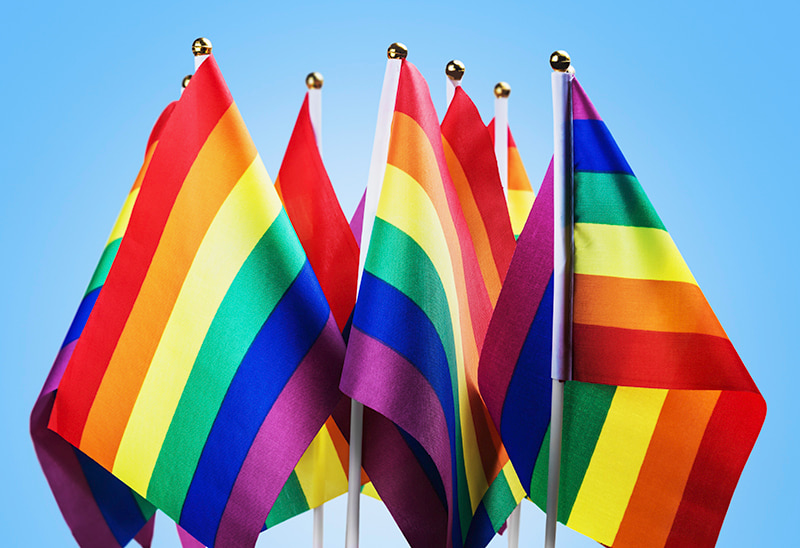
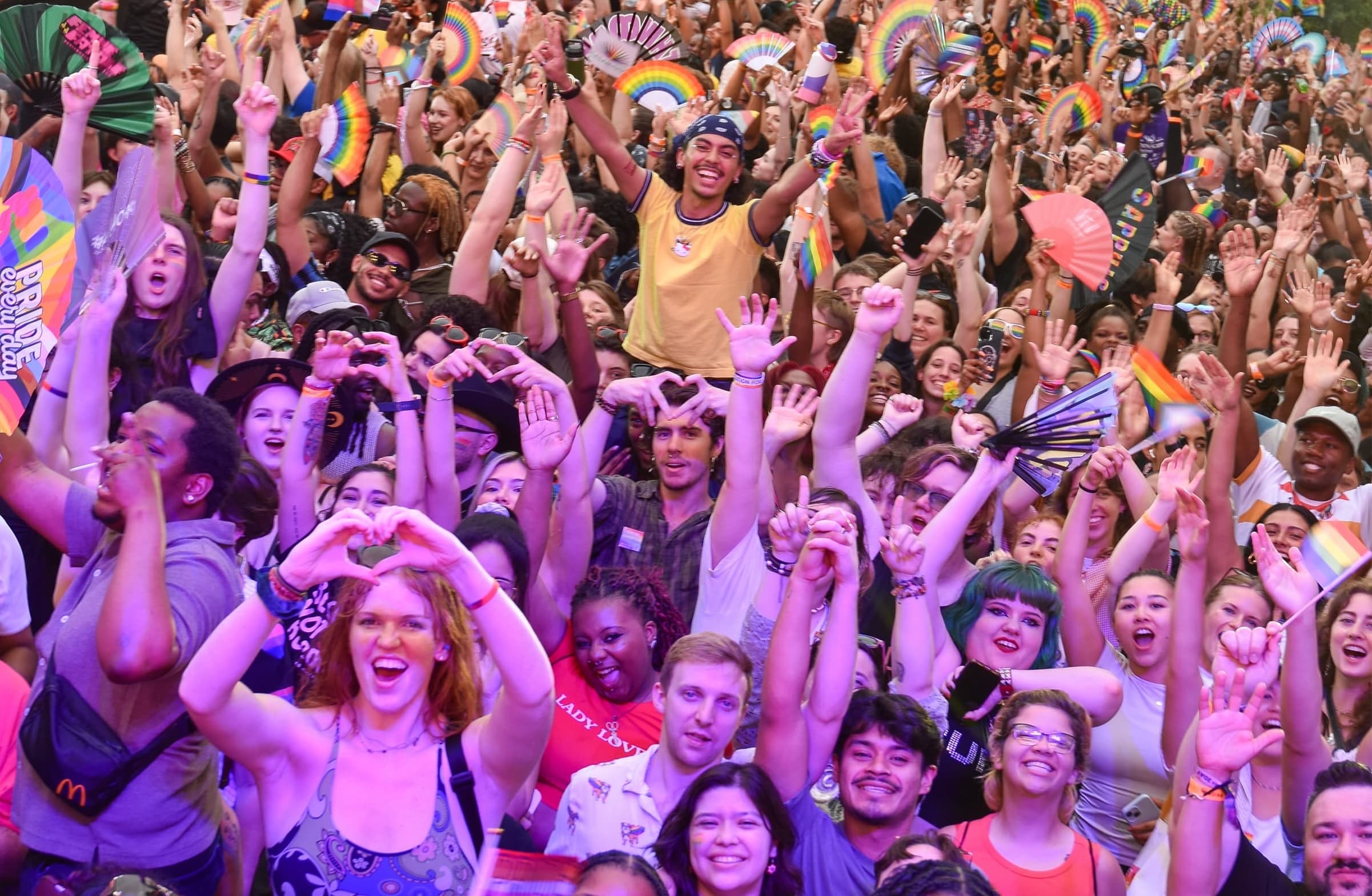
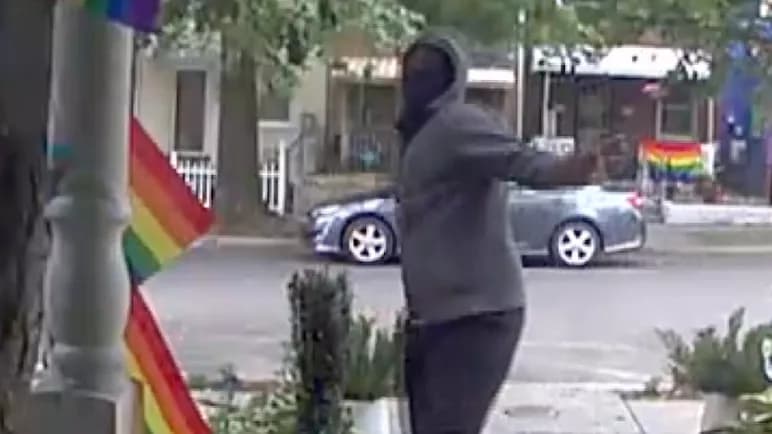












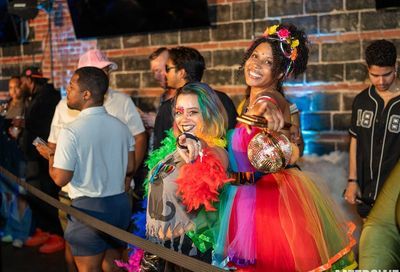
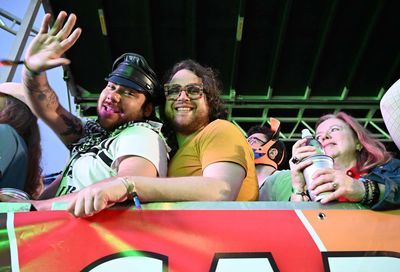
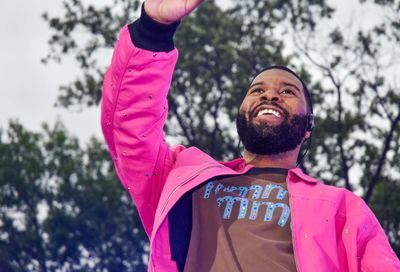
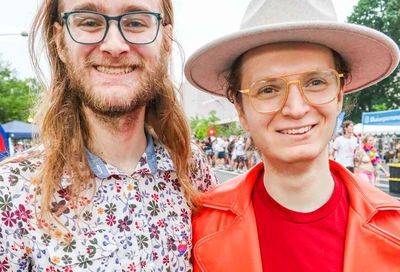
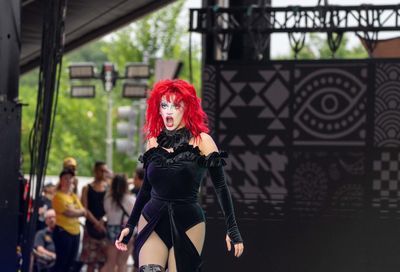

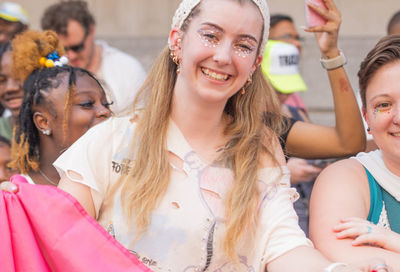
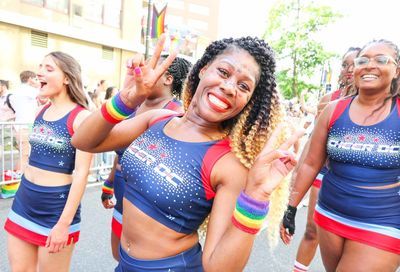
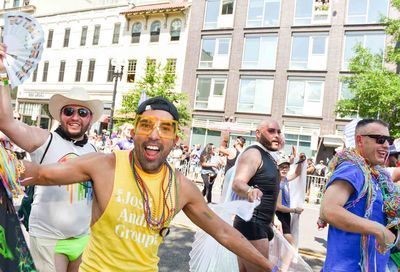
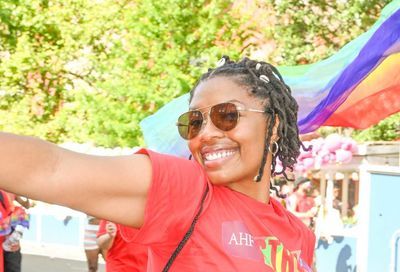
You must be logged in to post a comment.